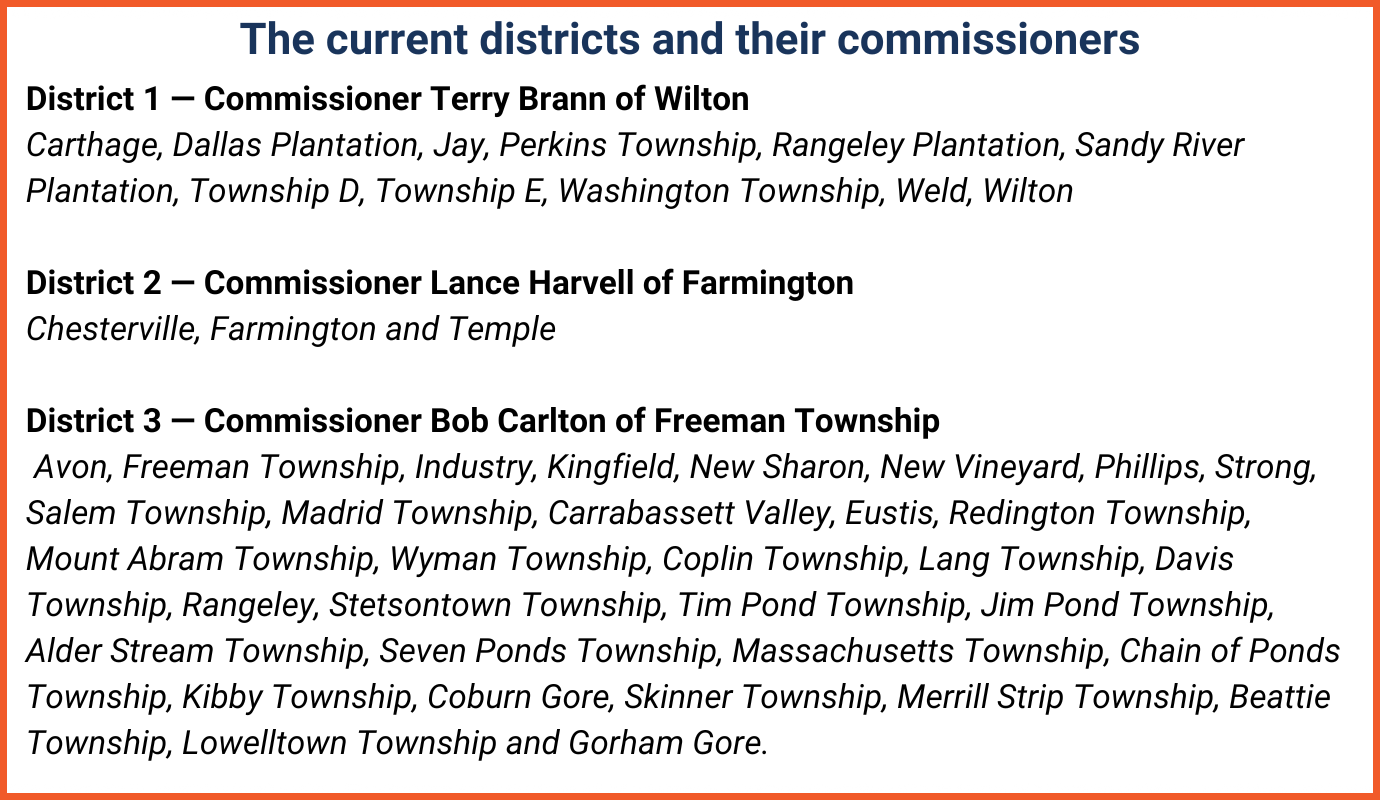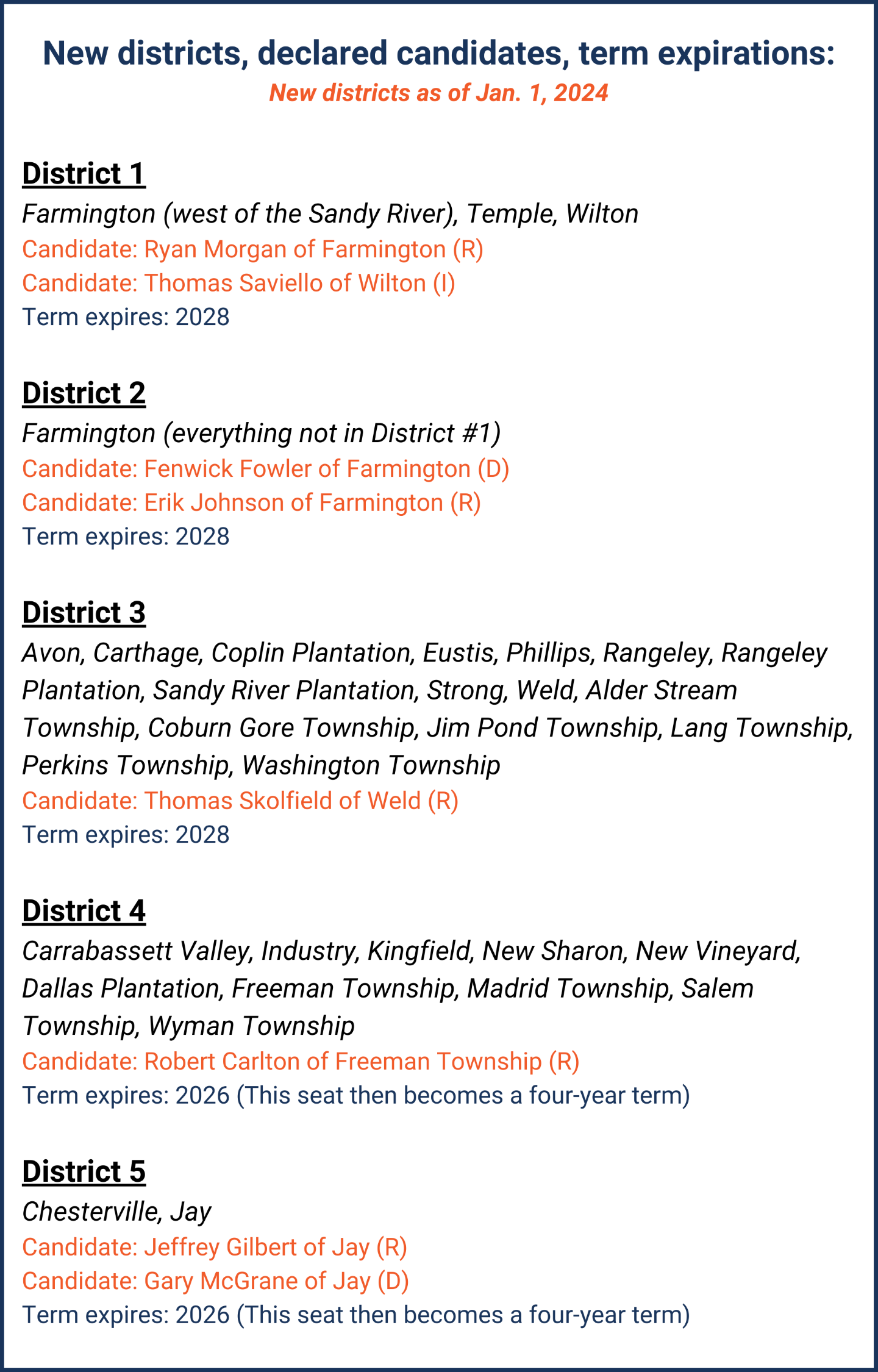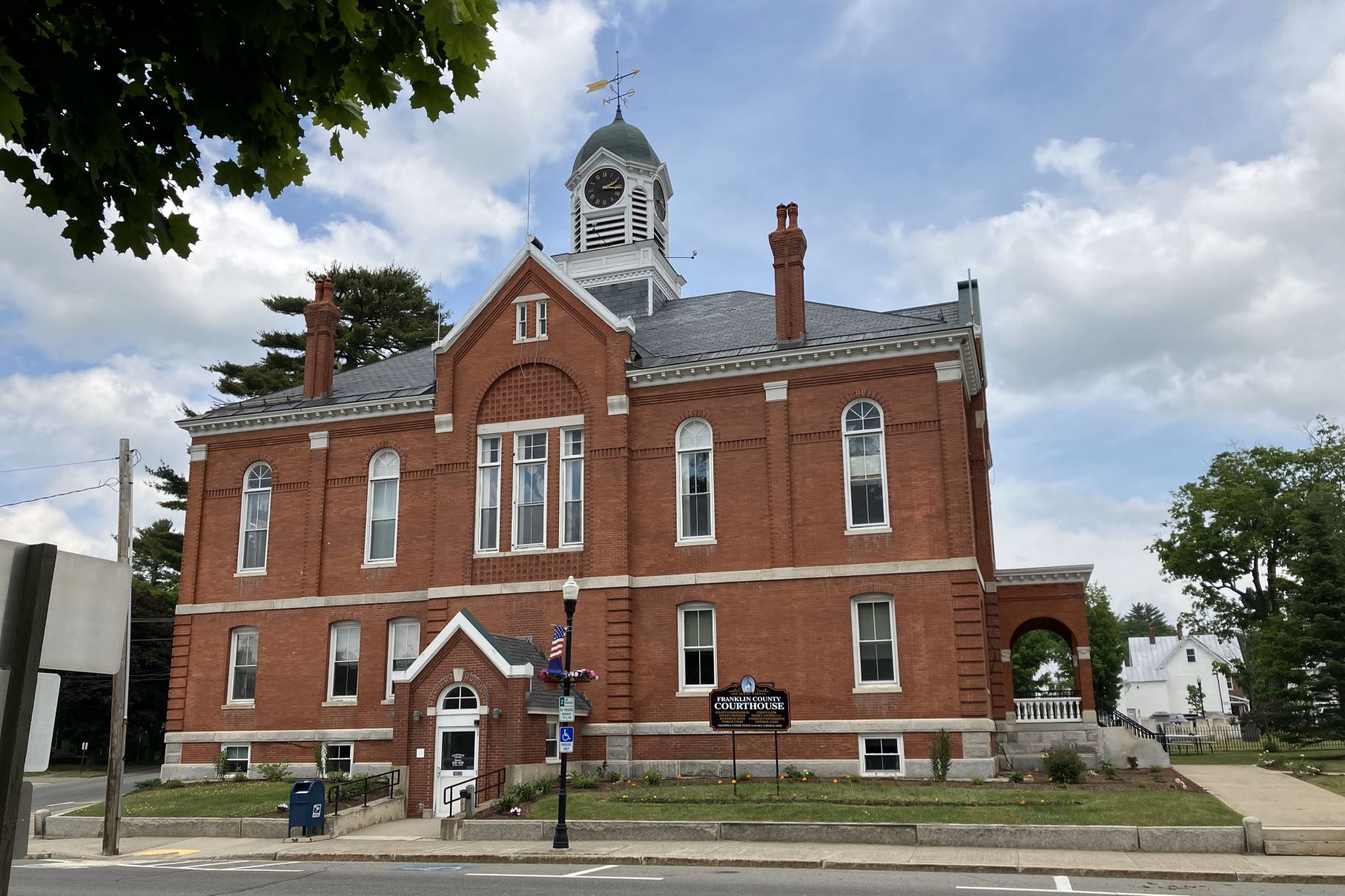In a shift several years in the making, voters will elect a new board of Franklin County commissioners this November, as the county’s three districts are divided into five.
With two members of the current board not seeking reelection, residents will have the unusual opportunity to set a largely new slate of leaders for their changing county, which has seen significant growth in recent years.
In Franklin County, county commissioners oversee a $10.6 million annual budget that funds 87 full-time, part-time and elected officials providing an array of services, including the offices of the sheriff and district attorney, emergency management, dispatch, the registry of deeds, probate court and county jail operations.
For the unorganized territory section of the county — a wide swath of plantations and townships that lack local government — commissioners are responsible for appropriating a roughly $2 million annual budget that covers everything from road maintenance to fire protection.
Also, commissioners distribute millions of dollars from other sources, such as the federal American Rescue Plan Act, funds captured through the county’s Tax Increment Financing district, and money from the National Opioids Settlement. County commissioners serve four-year terms and receive an annual $12,000 stipend.
County commission boards in Maine range from three to seven members; the number is set by statute.
According to Rep. Scott Landry (D-Farmington), the board expansion was designed to increase representation for two northern areas of the county, Rangeley and Carrabassett Valley.
“They’re the biggest tax base in the county and had the least representation,” said Landry, who sponsored the bill requiring the county to hold a referendum on expanding the board.
The legislature passed the bill and residents approved the five-district concept in 2021, with 58 percent of the 9,750 ballots cast in favor. Because the state is required to draw county districts to reflect roughly equal populations, Franklin County’s current and future districts were reapportioned in 2022 as part of an emergency bill signed by Gov. Janet Mills.
A changing county
“The secret is out,” Commissioner Robert Carlton of Freeman Township said. “Franklin County is a great place to work, live and play.”
Carlton represents District 3 and is running unopposed for District 4, one of the two districts that will be created by effectively cracking the northern part of the county in half. He said that like the state itself, there was very much a northern and southern Franklin County: regions with very different priorities, opportunities and challenges. He agreed a lack of representation for residents in the rapidly growing northern part of the county led to the expansion of the board.
An assessment of the workforce of five northern Franklin County communities, commissioned by Carrabassett Valley (home to Sugarloaf Mountain) found that while the county’s population as a whole decreased by 0.5 percent from 2010 to 2021, the population of the study area went up by more than 5 percent. Statewide the average growth was 3.7 percent).
The study area’s median household income was $59,375 — higher than both the county’s (at $51,535) and the state’s ($58,006). Carrabassett Valley and Rangeley contributions to the county’s tax base now outstrip Farmington, the most populous town and county seat, as well as Jay, previously the biggest tax contributor, which has dropped in valuation over the past decade as the Androscoggin Mill slowed operations.

So many people are working in the northern part of the county that a lack of housing is a major issue for Carlton.
The study found that of the 1,644 people working in the area, only 27 percent lived within 10 miles of their job. A quarter of the workers, more than 400 people, traveled greater than 50 miles to work.
“Housing is killing us,” Carlton said. For example, he said he spoke with a medical professional moving into the area — a critical need for the county — who hadn’t found a place to live.
Efforts are underway to provide more housing. Last year, Saddleback opened a $10 million housing facility for up to 70 ski resort employees and other workers in the Rangeley region.
Western Maine Mountain Housing, a nonprofit seeking to create workforce housing in the northern part of the county, saw its plans to construct two nine-unit apartment buildings in Kingfield collapse in March after voters there rejected a zoning change that would have allowed the project to move forward. WMMH had secured $1.5 million to construct the housing and is now looking for another site.
In addition to demanding new construction, more people means more traffic (and complaints) on unpaved or in some cases unmaintained roads, and more calls for fire protection and law enforcement.
Growth has brought issues other than housing. As is the case with much of rural America, opioid abuse is a major issue. Carlton, a volunteer firefighter, said he regularly hears emergency calls relating to opioid overdoses over the scanner.
The county formed — then suspended — an advisory committee to guide commissioners in distributing more than $1 million in funds garnered through a federal settlement. Committee members have varying opinions about why the process broke down; one point that did come out was no commissioner had been available to go to the meetings, sending County Administrator Amy Bernard as a representative instead. Carlton has since volunteered to serve on the committee if a restructured process restarts later this year.
This issue underlines a major benefit of having additional commissioners on the board. According to proponents, it will add more bodies for the committees and organizations that fall beneath the board’s umbrella of responsibilities.
Franklin County still has opioid settlement money to distribute, as well as nearly $6 million in ARPA funding that must be allocated by the end of the year. Commissioners also manage the funds that come in connected to a tax shelter for the Kibby Wind Power Project.
Carlton said it wasn’t unusual for him to attend two or three meetings a week on anything from trail networks to tax rates. He estimated he averaged 25 hours a week on county business.
“There’s a lot of people that knock on the door,” he said.
Getting to work
Commissioner Lance Harvell of Farmington, who represents District 2, currently serves as the board’s rotating chair. He is not running for one of the new districts.
While Harvell noted he was initially skeptical about the expansion, he said it had merits, such as providing additional representation for residents. Another change Harvell supported related to the budget review process: Currently, commissioners must be unanimous to overturn alterations to the budget made by the budget committee, an advisory board made up of nine selectmen.
Next year, only three of the five commissioners must agree to overrule the budget committee, a change Harvell said would help shift authority over the budget and tax policy back to commissioners.
The commissioners and budget committee often disagree, sometimes due to differing philosophies or opinions about spending priorities. Last month, for example, the budget committee supported a 4 percent cost of living increase versus the commissioners’ 3 percent. The budget committee voted to overrule the commissioners’ changes, including $100,000 added late in the process to cover costs associated with a federal labor law.
Tiffany Maiuri, chair of the Wilton Board of Selectpersons called the addition of two commissioners “a fabulous idea that makes a lot of sense,” as it would provide more representation and a better basis for governing.
Maiuri said that the budget process — described in just four lines in the state statutes — needs more clarity, and that there is some support among commissioners she spoke with for addressing that via a county charter.
After the board expansion was approved, the county incorporated the needs of the larger board into its ongoing Emergency Operations Center project. That $4.4 million facility will bring multiple county departments under one roof on county-owned property near the Franklin County Detention Center.
For Bernard and county government employees, one of the biggest changes will be she’ll have “four new bosses,” as she put it. While many of the candidates have experience on town boards, in county government, and/or with the state legislature, Bernard is planning an orientation process to rapidly bring them up to speed between November’s election results and the start of the new districts on Jan. 1.
“We’re going to have a new board, pretty much,” Bernard said. “We need to remember for new members to be patient and thorough.”
Following the orientation process, Barnard anticipates commissioners entering what she refers to as the cycle of county government. Department heads will work on their budgets as early as the end of January, with commissioners and budget committee processes running into May.
In the fall, commissioners approve a second budget for the unorganized territories that is then submitted to the state. That budget, set at $2.08 million last year, funds road work, ambulance services, snow removal, waste disposal and fire protection; in some cases the county hires its own personnel, like a road agent to oversee maintenance, and in others it contracts with municipalities to respond to fires and accept trash from territory residents.
Harvell pointed to a number of challenges the future board will face: rising costs to operate the jail, rebuilding roads and bridges wiped out during last winter’s flooding, and maintaining a workforce in an aging state. Bernard is looking toward department operations as well, including balancing employee salary expectations and retention with increasing costs.
One new resource commissioners intend to develop will be Franklin County’s first strategic plan, something Carlton and others have pushed in an effort to be more proactive to the needs of a changing county.
The plan is designed to help commissioners prioritize ‘what works and what doesn’t,’ as Harvell put it. A series of listening sessions will be held this summer, with the next meeting set for 6 p.m., June 24 at the Rangeley Town Office.
Carlton supports the expansion of the board, in part to get two more voices and sets of ideas in the room, but also for the improved representation. He said he always tries to put the entire county first, not just his district.
“It’s Franklin County, the whole place,” he said. “Politics ends at the door.”








